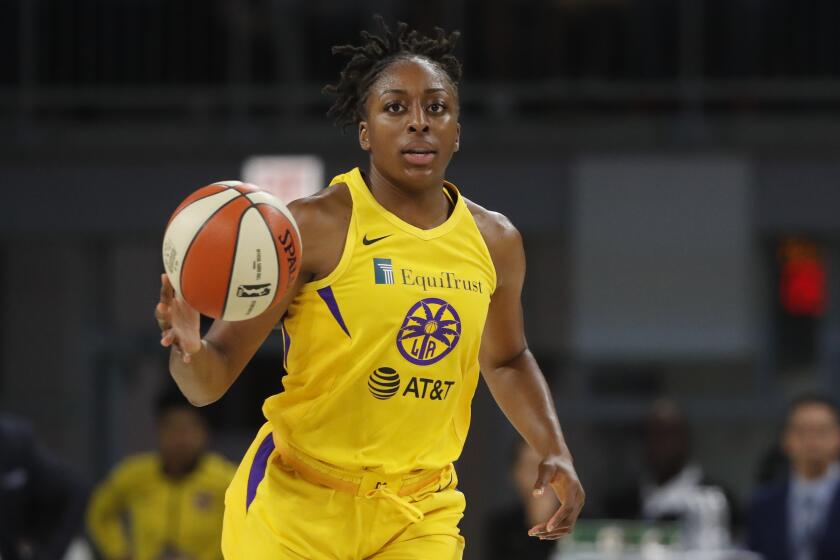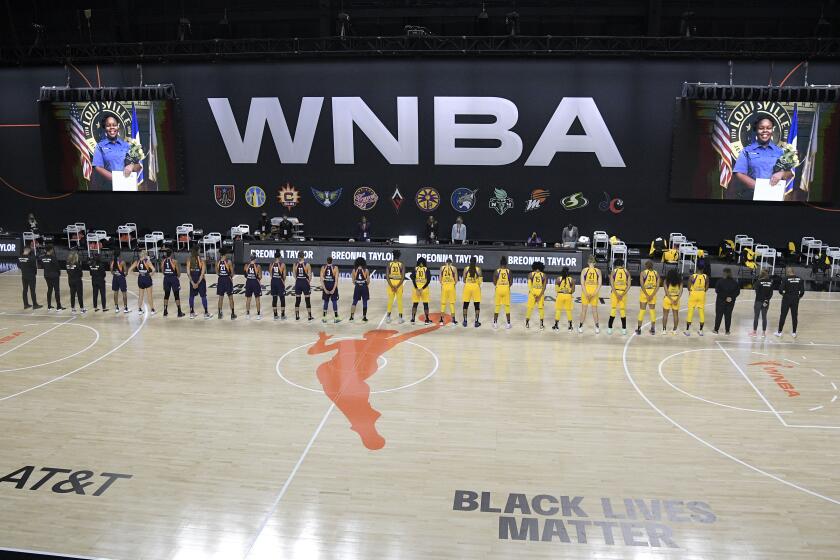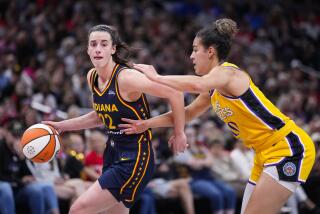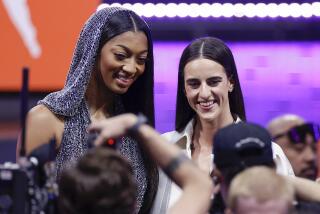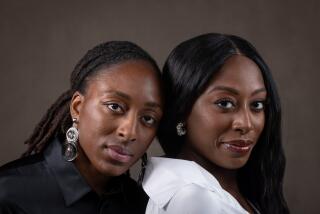‘We can’t stop now’: Sparks’ Nneka Ogwumike on Juneteenth, WNBA activism
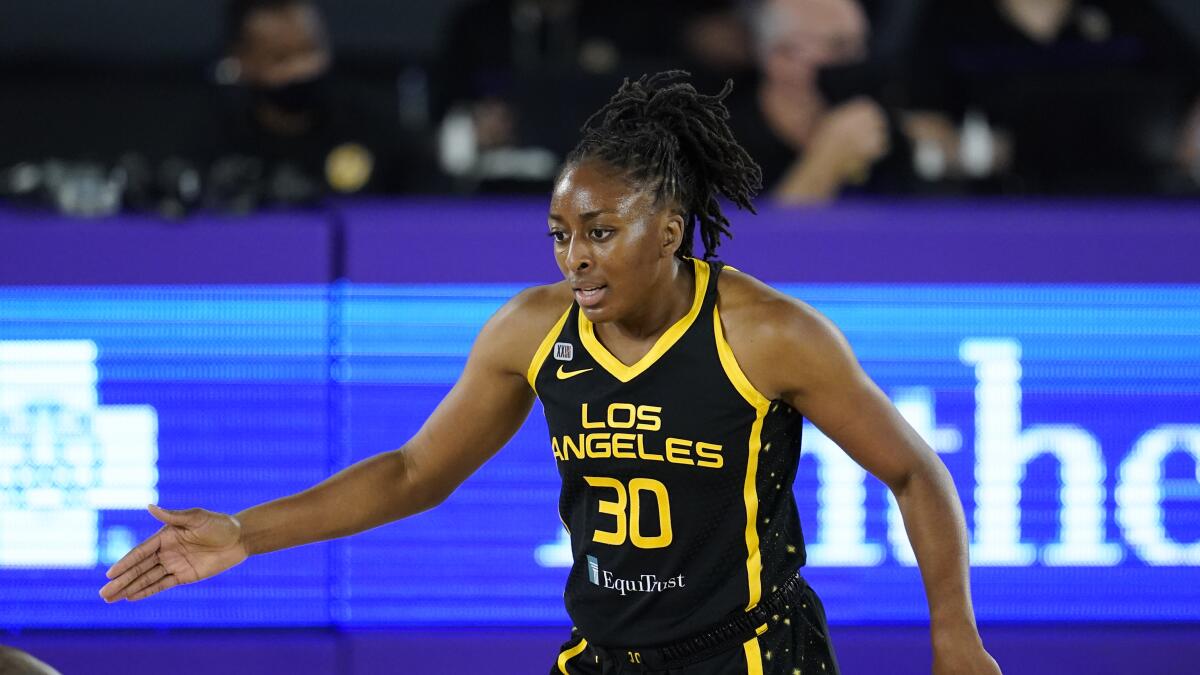
- Share via
Before Juneteenth entered the public consciousness during last summer’s unrest, the day commemorating the end of slavery in the United States was a state holiday in Texas.
Yet Nneka Ogwumike, Sparks forward and Houston native, admits she wasn’t taught about Juneteenth in school even though she lived within an hour of Galveston, where Union soldiers brought the news of freedom to enslaved Black people in 1865.
New legislation marking June 19 as a federal holiday this week was celebrated as an important moment to recognize the history of Black people in the United States, but hours after the bill moved past the house on Wednesday, Ogwumike raised a skeptical eyebrow over her blue Adidas face mask when considering about how much has really changed.
Specifically, she thinks about students in her home state, where Gov. Greg Abbott recently signed a law that bars certain concepts related to race and racism from being taught in schools.
“It may seem like we’ve reached new heights for certain people, but if we’re one people, one nation, [this] certainly is by no means the standard by which we want to progress,” Ogwumike said. “We can’t stop now.”
With new contract in hand, All-Star forward Nneka Ogwumike says she likes being in Sparks’ leadership role as team retools for WNBA season.
Three days before Juneteenth, the Sparks forward and WNBPA president spoke with The Los Angeles Times to reflect on how the WNBA flipped the U.S. Senate, solidifying its position as a leader for activism in sports, and how players are staying in the fight even after the 2020 ballots have been counted.
“We’re a league of Black women, so everything that we experience is political or has social implications to our existence,” Ogwumike said in a room at the Los Angeles Convention Center before a game. “We want to continue to live by that and serve those that are looking for direction or looking for support.”
Ogwumike often calls the 2020 season the time when the WNBA’s movement met its moment. The pandemic brought the entire league to Bradenton, Fla., as conversations about racial inequalities were at their peak and the WNBA responded with a deliberate social justice agenda.
Before the season, the league and players announced a Social Justice Council. They dedicated the season to the Say Her Name movement, wore Breonna Taylor’s name on their jerseys and played on a court emblazoned with “Black Lives Matter.” They threw their support behind the Rev. Raphael Warnock in a U.S. Senate race, who was running against then-Atlanta Dream owner Kelly Loeffler. Warnock and Jon Ossoff are now Georgia’s first Democratic senators since 2000.
Warnock’s campaign took off after WNBA players wore “Vote Warnock” shirts, and Ogwumike believes the effort epitomized how WNBA players can organize around their values to influence change.
Two basketball bubbles in Orlando brought global attention to issues of social justice. Once again, the WNBA was a step ahead.
“A lot of times as athletes, there’s the challenge of ‘shut up and dribble,’ and there’s also the challenge of being out there and saying things and having to live by that,” Ogwumike said. “We really struck a chord in a way that was just beautiful.”
When the league stopped play for two days after the shooting of Jacob Blake, players organized a vigil to consider their next steps. The following day, they appeared on ESPN with every player standing shoulder-to-shoulder with arms linked while wearing shirts that read “Arrest the cops who killed Breonna Taylor.” It was a striking visual to the power of a united front.
“We were just trying to show what’s important to us and it also ending up being a microcosm of what our country can be like, both in advocacy and allyship,” Ogwumike said.
With teams returning to normalcy, Ogwumike believes the “Wubble” was just the point of origin for several vectors now spreading throughout home markets. With the WNBA enjoying rising television ratings and a growing sponsorship portfolio, all signs are pointing up, and activism remains as strong as ever, even though much of the organizing takes place behind closed doors now.
This season, the WNBPA and Social Justice Council turned their attention to health equity, a topic emphasized by the disproportionate suffering in Black and brown communities during the ongoing pandemic. Ogwumike, league MVP A’ja Wilson, Atlanta Dream forward Elizabeth Williams and Minnesota Lynx guard Layshia Clarendon appeared in a vaccine-related public service announcement addressing Black women, a group in which about one in five say they “definitely will not” get a COVID-19 shot and 41% will take a “wait and see” approach, according to analysis from the Kaiser Family Foundation.
“We are Black women so we were speaking about things that affect us,” said Ogwumike, who once had ambitions to go to medical school. “And quite frankly, we understand that as Black women, we often come at the bottom of the barrel. So if you raise that group of people, it ultimately raises everyone. We wanted everyone to take seriously what was going on because I think even outside of the pandemic, we were getting a lot of information. Whether it was misinformation or overinformation, we wanted to kind of balance that out a little bit.”
After a two-day stoppage as players and the league reacted to the police shooting of Jacob Blake, the WNBA will resume games Friday.
For the women of the WNBA, being at the forefront of the social justice conversation is more than PSAs and social media statements. Players attended Zoom meetings with vaccine experts before publicly backing the campaign. Some attended a special briefing with Sen. Cory Booker (D-N.J.) about the George Floyd Justice in Policing Act. They videoconferenced with Michelle Obama and Stacey Abrams last year. Each meeting is like getting a crash course in a new field, Ogwumike said.
As WNBA players are celebrated for their advocacy off the court, Ogwumike feels there is also growing interest in the league. The WNBA is celebrating its 25th season with increased media attention and more games on TV. Each broadcast shows the WNBA’s dedication to social justice because even after many professional sports leagues have gone back to the status quo, WNBA courts still feature the message “Black Lives Matter.”
“We don’t do it because it’s trendy,” Ogwumike said. “We educate ourselves and we try our best to do what we can to push the dial, to be on the right side of history and to make progress, so all we ask is for everyone else to do the same. And I think especially on Juneteenth, take a second to go read about what it is, why it is now a federal holiday and why it shouldn’t stop at that.”
More to Read
Go beyond the scoreboard
Get the latest on L.A.'s teams in the daily Sports Report newsletter.
You may occasionally receive promotional content from the Los Angeles Times.

